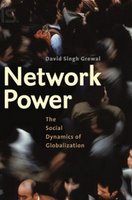Book Review: Network Power – David Singh Grewal
Globalization is reintroduced to society in David Singh Grewal’s “Network Power”. A volume that contains so much information, it can easily be viewed as a contemporary globalization handbook. Grewal’s perspective is fresh and bold, albeit not empirically substantiated. The lack of empirical evidence is easily overlooked, by the sheer intelligence of Grewal’s arguments, and the historical validity of his observations and considerations.
 Grewal himself acknowledges that globalization is a beast of a topic that can often be misdefined, or misused. “The global coordination of international standards” is the one-line definition of globalization Grewal wants readers to keep in mind, as he introduces the main theme of the book, network power. This is essentially a type of global common sense that is adopted by a network of people, governments, and nations either directly or indirectly. It relies on the concept that standards are of greater value when more people use them, and some standards are established through sovereign collective decision making, while others are defined through decentralized local decisions that in the end, affect the entire group. These standards create network power, which directly and indirectly guides globalization.
Grewal himself acknowledges that globalization is a beast of a topic that can often be misdefined, or misused. “The global coordination of international standards” is the one-line definition of globalization Grewal wants readers to keep in mind, as he introduces the main theme of the book, network power. This is essentially a type of global common sense that is adopted by a network of people, governments, and nations either directly or indirectly. It relies on the concept that standards are of greater value when more people use them, and some standards are established through sovereign collective decision making, while others are defined through decentralized local decisions that in the end, affect the entire group. These standards create network power, which directly and indirectly guides globalization.
“The idea of network power argues that we are pulled by our choices along avenues smoothed by the prior choices of others.” In conjunction with this theme, the dominance of the English language is explored and justified by its economic necessity. Grewal has an interesting argument with himself on evaluating the quality of network power, and what can be done to defuse it when necessary. This is a bold stance to take, as Grewal is challenging his own beliefs, to prove just how valid they are. The book is very balanced between traditional topics of globalization like technology and world trade, while still covering new and edgy topics like neoliberalism, and our goal of not descending into a McWorld through cultural globalization.
“Globalization can be reworked, but not rejected…it depends on what we decide to make of it together.” This message is consistent throughout the book, reminding readers that globalization is not going anywhere, while reinforcing the concept of network power. It reminds readers that the standards we establish together will end up carrying greater validity then the ones we define by ourselves. A bold message to anti-globalization theorists, and a rational message to the average reader trying to understanding this newly shaping world.
Grewal, David Singh. Network Power: The Social Dynamics of Globalization.
Ann Arbor, MI: Sheridan Books, 2008.